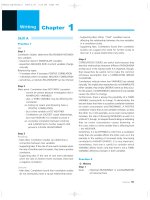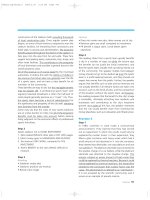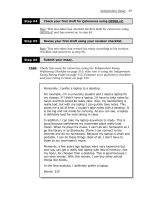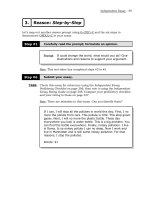Tài liệu Vocabulary for the toefl ibt part 8 pdf
Bạn đang xem bản rút gọn của tài liệu. Xem và tải ngay bản đầy đủ của tài liệu tại đây (146.95 KB, 10 trang )
COMMONLY CONFUSED WORDS—HOMONYMS
63
FREQUENTLY CONFUSED WORDS
The following table lists some of the most frequently confused word pairs along
with a brief definition of each word.
CONFUSING WORDS QUICK DEFINITION
accept to recognize
except excluding
access (verb) to gain entry to
access (noun) means of approaching
excess extra
adapt to adjust
adopt to take as one’s own
affect to influence
effect (noun) result
effect (verb) to bring about
all ready totally prepared
already by this time
all ways every method
always forever
among in the middle of several
between in an interval separating (two)
assure to make certain (assure someone)
ensure to make certain (to check for yourself)
insure to make certain (financial value)
beside next to
besides in addition to
bibliography list of writings
biography a life story
6044_Vocabulary_ToefliBT(4).qxd 9/19/07 11:44 AM Page 63
VOCABULARY FOR TOEFL iBT
64
CONFUSING WORDS QUICK DEFINITION
breath (noun) respiration
breathe (verb) to inhale and exhale
breadth width
capital (noun) money
capital (adjective) most important
capitol government building
complement (noun, verb) match
compliment (noun, verb) praise
disinterested no strong opinion either way
uninterested unengaged; having no interest in
envelop to surround
envelope paper wrapping for a letter
farther beyond
further additional
immigrate to enter a new country
emigrate to leave a country
imply to hint, suggest
infer to assume, deduce
its belonging to it
it’s it is
loose not tight
lose unable to find
may be something may possibly be
maybe perhaps
overdo to do too much
overdue late
6044_Vocabulary_ToefliBT(4).qxd 9/19/07 11:44 AM Page 64
COMMONLY CONFUSED WORDS—HOMONYMS
65
CONFUSING WORDS QUICK DEFINITION
personal individual
personnel employees
precede to go before
proceed to continue
proceeds profits
principal (adjective) main
principal (noun) person in charge; sum of interest-earning money
principle standard
stationary still, not moving
stationery writing material
than in contrast to
then next in time
their belonging to them
there in a place
they’re they are
weather climate
whether if
who substitute for he, she, or they
whom substitute for him, her, or them
whose belonging to whom
who’s who is
your belonging to you
you’re you are
6044_Vocabulary_ToefliBT(4).qxd 9/19/07 11:44 AM Page 65
VOCABULARY FOR TOEFL iBT
66
Another important reason to review homonyms like team/teem and waive/wave is
to avoid a “trap” sometimes set by the test developers. That is, you might encounter
questions that use the definition of a familiar homonym as a distracter. Here’s an
example:
To waive means
a. to signal with an up and down or back and forth movement.
b. to return to the original starting point.
c. to relinquish a right or claim.
d. to swell up or rise to the surface.
The correct answer is c. Waive means to give up (a right or claim) voluntarily,
relinquish; to refrain from enforcing or insisting upon (a rule, penalty, standard pro-
cedure, etc.). If you don’t know the meaning of waive, however, you might be
tempted to choose a, which is the definition of its homophone wave, or d, which is
related to the definition of a wave. These answer choices are tempting because they
sound familiar. You need to be able to recognize the familiar homophone and recall
its definition.
Not all commonly confused words are homonyms. Take disinterested and unin-
terested as an example. They don’t sound the same because they have very distinct
prefixes. But the prefixes are attached to the same root, and the prefixes seem to
have essentially the same meaning: dis- means away from, apart, reversal, not; un-
means not, against. Thus many people assume that both words mean the same
thing: not interested. However, only uninterested has this meaning. Disinterested
means impartial or unbiased, free of selfish motives or interests—a different word
entirely.
Some commonly confused words are particularly puzzling because the words not
only sound similar, but they also have similar meanings. Take the homophones cue
and queue, for example. Both mean a line of waiting people or vehicles, although
queue is used far more often than cue for this meaning. However, cue also means a
signal, such as a word or action, given to prompt or remind someone of
something—and this is its most common usage. And queue can also mean an
ordered list of tasks to be performed or sequence of programs awaiting processing
on a computer.
6044_Vocabulary_ToefliBT(4).qxd 9/19/07 11:44 AM Page 66
COMMONLY CONFUSED WORDS—HOMONYMS
67
HERE’S A HINT
TRICKY VERBS
These verbs confuse even native speakers of English. To keep them straight, think
about which verb in a pair needs an object (a noun or pronoun that’s acted on by
a verb). Practice using these verbs in context and you will become more comfort-
able with them.
Lie Lay
Lie means to rest, to recline. Lay means to place, to set down.
(subject) (needs an object)
past tense: lay, had lain I always lay my purse on the table.
Don’t just lie there, do something!
Sit Set
Sit means to rest. Set means to put or place.
(subject) (needs an object)
She always sits in the third row. He set the newspaper on the desk.
Rise Raise
Rise means to go up. Raise means to move something up.
(subject) (needs an object)
After it is filled with helium, the The state is raising taxes this year.
balloon rises.
You already know many homophones and commonly confused words inside and
out. The ones you don’t know, you simply need to memorize. The question is, how
do you remember these differences in meaning, especially when the words seem so
much alike? The key is to capitalize on the differences in the words. And when it
comes to frequently confused words, mnemonic devices come in especially handy.
Take the commonly confused pair ingenious and ingenuous, for example:
➥ ingenious: marked by inventive skill or creativity; showing inventiveness
and skill, remarkably clever
➥ ingenuous: 1. not cunning or deceitful, unable to mask feelings; artless,
frank, sincere. 2. lacking sophistication or worldliness
The only difference in the spelling of these words is the i/u. You can use this dif-
ference to remember key words in the definition of each word.
J
6044_Vocabulary_ToefliBT(4).qxd 9/19/07 11:44 AM Page 67
VOCABULARY FOR TOEFL iBT
68
➥ ingenious: inventive
➥ ingenuous: unable to mask feelings
Similarly, the difference between disinterested and uninterested is the prefix. Use
this to help you remember the meaning: a disinterested person is distanced from the
situation and is therefore impartial.
Here is a list of more commonly confused word sets that include important
vocabulary words for your TOEFL iBT test preparation.
allude (
a˘·'lood) v. to make an indirect reference to
elude (
i·'lood) v. 1. to escape from or evade, especially by cleverness, daring,
or skill. 2. to be incomprehensible to, escape the understanding of
appraise (
a˘·'prayz) v. 1. to evaluate. 2. to establish value or estimate the worth of
apprise (
a˘·'pr¯z) v. to give notice or information to; to make aware of, inform
ascent (
a˘·'sent) n. 1. an upward slope. 2. a movement upward, advancement
assent (
a˘·'sent) n. agreement; concurrence; consent
censor (
'sen·so˘r) v. to forbid the publication, distribution, or other public dis-
semination of something because it is considered obscene or otherwise polit-
ically or morally unacceptable. n. an official who reviews books, films, etc.
to remove what is considered morally, politically, or otherwise objectionable
censure (
'sen·shu˘r) n. expression of strong criticism or disapproval; a rebuke
or condemnation. v. to criticize strongly, rebuke, condemn
sensor (
'sen·so˘r) n. a device that receives and responds to a stimulus such as
light, smoke, etc.
cue (kyoo) n. 1. a signal, such as a word or action, given to prompt or remind
someone of something; a hint or suggestion. 2. a line of waiting people or
vehicles; a queue
queue (kyoo) n. 1. a line of waiting people or vehicles. 2. (in information pro-
cessing) an ordered list of tasks to be performed or sequence of programs
awaiting processing
6044_Vocabulary_ToefliBT(4).qxd 9/19/07 11:44 AM Page 68
COMMONLY CONFUSED WORDS—HOMONYMS
69
decent ('dee·se˘nt) adj. 1. conforming to what is socially or morally suitable or
correct. 2. meeting acceptable standards; sufficient, adequate
descent (di·
'sent) n. 1. the act of descending or moving downward; a down-
ward slope or movement. 2. hereditary derivation; lineage
dissent (di·
'sent) v. 1. to differ in opinion, disagree. 2. to withhold approval
or assent. n. 1. a difference of opinion. 2. nonconformity
deprecate (
'dep·re˘·kayt) v. to express disapproval of; to belittle, depreciate
depreciate (di·
'pree·shi·ayt) v. 1. to diminish in price or value; to lessen the
worth of. 2. to think or speak of as being of little worth; to belittle
disburse (dis·
'burs) v. to pay out
disperse (di
s·'spurs) v. 1. to separate and scatter in different directions; to
cause to do so. 2. to distribute widely, disseminate
elicit (i·
'lis·it) v. 1. to call forth or draw out; to provoke. 2. to deduce or derive
by reasoning
illicit (i·
'lis·it) adj. illegal, forbidden by law; contrary to accepted morality or
convention
eminent (
'em·˘·ne˘nt) adj. towering above or more prominent than others, lofty;
standing above others in quality, character, reputation, etc.; distinguished
imminent (
'im·˘·ne˘nt) adj. about to occur; impending
emanate (
'em·a˘·nayt) v. to come or issue forth, as from a source
extant (
'ek·sta˘nt) adj. still in existence; not extinct, destroyed or lost
extent (ik·
'stent) n. the range, distance, or degree to which something reaches
or extends. 2. a wide and open space or area
fain (fayn) adv. with joy; gladly
feign (fayn) v. to pretend, to give the false appearance of
faux (foh) adj. artificial, fake; not genuine or real
foe (foh) n. an enemy, adversary, or opponent
hoard (hohrd) n. a hidden store or stock, cache. v. to collect and lay up; to
amass and store in secret
horde (hohrd) n. a large group or crowd; a vast multitude
6044_Vocabulary_ToefliBT(4).qxd 9/19/07 11:44 AM Page 69
VOCABULARY FOR TOEFL iBT
70
incredible (in·'kred·˘·be˘l) adj. 1. implausible, beyond belief. 2. astonishing
incredulous (in·
'krej·u˘·lu˘s) adj. skeptical, unwilling to believe
ingenious (in·
'jeen·yu˘s) adj. marked by inventive skill or creativity; showing
inventiveness and skill, remarkably clever
ingenuous (in·
'jen·yoo·u˘s) adj. 1. not cunning or deceitful, unable to mask
feelings; artless, frank, sincere. 2. lacking sophistication or worldliness
meddle (
'med·e˘l) v. to intrude in other people’s affairs; interfere
mettle (
'met·e˘l) n. courage, fortitude, spirit
peak (peek) v. to reach its highest point or maximum development, activity,
or intensity. n. 1. the sharp end of something tapering to a point. 2. the
pointed top of a mountain, summit. 3. the highest possible point of devel-
opment, activity, or intensity
peek (peek) v. to glance quickly or peer at furtively. n. a brief or furtive look.
pique (peek) v. 1. to cause annoyance or irritation; to vex or create resentment.
2. to provoke or arouse
persecute (
'pur·se˘·kyoot) v. to oppress, harass, or mistreat, especially because
of race, religious or political beliefs, or sexual orientation
prosecute (
'pros·e˘·kyoot) v. 1. to bring a criminal action against. 2. to carry
on, continue, practice
prescribe (pri·
'skr¯b) v. 1. to issue commands, order something to be done;
dictate. 2. to order a medicine or other treatment
proscribe (proh·
'skr¯b) v. to prohibit, forbid by law
raise (rayz) v. 1. to lift, make higher; put in an upright position 2. to increase
in size, quantity, intensity, degree, or strength. n. 1. the act of raising or
increasing. 2. an increase in salary
raze (rayz) v. 1. to level to the ground, demolish completely. 2. to erase,
obliterate
team (teem) v. to join together so as to form a team. n. a group organized to
work together; a cooperative unit
teem (teem) v. to be full of; to be present in large numbers
6044_Vocabulary_ToefliBT(4).qxd 9/19/07 11:44 AM Page 70
COMMONLY CONFUSED WORDS—HOMONYMS
71
waive (wayv) v. 1. to give up (a right or claim) voluntarily, relinquish. 2. to
refrain from enforcing or insisting upon (a rule, penalty, standard proce-
dure, etc.); dispense with
wave (wayv) v. 1. to move up and down or back and forth; undulate. 2. to sig-
nal with an up and down or back and forth movement of the hand. n. 1. a
ridge or swell on the surface of a body of water. 2. a back-and-forth or up-
and-down movement, especially of the hand. 3. a surge, rush, or sudden
great rise
TIPS AND STRATEGIES
Homonyms and other frequently confused words can be particularly challenging,
especially when you have a limited amount of time to prepare for an exam. Here are
some specific tips and strategies to help you make the most of your study time.
●
Spelling is often the key to distinguishing between commonly confused
words. Meddle, for example, differs from mettle only because it contains the
letter d instead of t. Use this key difference to help you remember the dif-
ference in meaning as well. For example, you might remember that meddle
with a d is something you d
on’t want to do unless you want to annoy others.
●
Review, review, review. Use flash cards or other study strategies to review
these commonly confused words until you have them memorized. And then
review them again.
●
Use these words. If you use these words in your everyday writing and con-
versations, you will remember which word has which meaning. Or teach
them to someone else. Teaching something to another person is one of the
most effective ways to master that material.
●
Remember to make the most of your learning style. Use whatever study or
memorization techniques work best for you. For example, if you are a visual
learner, create pictures that will help you remember word meanings. If you
are an auditory learner, rhymes will be more effective.
●
Pay attention to details, and use them to help you remember the words and
their meanings. The more carefully you read each definition and the closer
you look at the spelling of each word, the more likely you are to find a “key”
for you to remember the differences between them. For example, appraise
has the word praise in it. You can associate praise with a good evaluation, and
appraise means to evaluate.
6044_Vocabulary_ToefliBT(4).qxd 9/19/07 11:44 AM Page 71
VOCABULARY FOR TOEFL iBT
72
●
Use your ears for the commonly confused words that aren’t homophones,
and use the difference in pronunciation to help you further differentiate
between the words.
●
Don’t forget to use word parts to remember meaning. Both prescribe and
proscribe, for example, have the root scrib/script, meaning to write. Then you
can remember that proscribe is a (written) law that prohibits something.
PRACTICE QUESTIONS
Choose the correct word in the parenthesis to complete each sentence. Circle your
choices or write your answers on a separate piece of paper. Then compare your
selections to the correct answers at the end of the chapter.
1. Lilin (alluded/eluded) to problems with her boss, but she didn’t say anything
directly.
2. Xiu is coming this afternoon to determine the (extant/extent) of the problem.
3. The checks were (disbursed/dispersed) this morning.
4. Once again, Luna has come up with an (ingenious/ingenuous) solution to the
problem.
5. We will (waive/wave) the late fee because of your extenuating circumstances.
6. Please (precede/proceed) with caution through the construction zone.
7. Reina is in (eminent/imminent/emanate) danger and needs our help right
away.
8. Jillian met with a lawyer to see if her landlord could be (persecuted/prosecuted)
for his negligence of her building.
9. It was a grueling six-hour (ascent/assent) from our camp to the top of the
mountain.
10. Here is a list of the books the school librarian would like to
(censor/censure/sensor) because she feels they are inappropriate for children.
6044_Vocabulary_ToefliBT(4).qxd 9/19/07 11:44 AM Page 72









